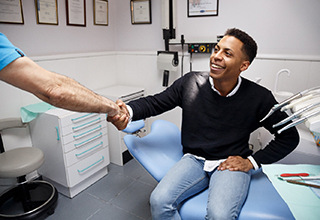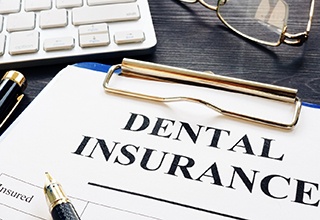Emergency Dentistry
EMERGENCY DENTIST – CONYERS, GA
PROVIDING FAMILIES IN CONYERS FAST, COMPASSIONATE DENTAL CARE
Dental emergencies always seem to happen at the most unexpected and stressful moments. If you’re not prepared, which most people aren’t, it can be hard to think clearly and make the best decisions for your oral health. If you find yourself in the midst of one of these situations, we recommend calling our office as soon as possible, so we can schedule an appointment for you and make sure you get the fast, pain-relieving care you require.
Why Choose Dr. Anushka Amin & Associates for Emergency Dental Care?
- Flexible Financing Available to Make Emergency Care Affordable
- Compassionate Dentist with Years of Experience Handling Emergencies
- Advanced Dental Technology for Fast & Precise Diagnosis
What to Expect in a Dental Emergency
If you or a loved one is experiencing new, painful, or concerning dental symptoms, give us a call right away. From there, here’s what you can expect:
- Get a Same-Day Appointment: We always go above and beyond to see our emergency patients the same day they call us. We’ll also provide first-aid instructions for handling your emergency until you can reach us.
- Your Emergency Exam with Dr. Amin: As soon as you arrive, Dr. Amin will see you for an emergency exam, taking any necessary X-rays, to better understand the source and extent of your emergency.
- Review the Findings & Make a Plan: After getting you out of any pressing dental pain, Dr. Amin will go over her findings and recommendations with you. From there, you’ll work together to create a custom treatment plan.
- Get the Personalized Care You Need: Once you’ve made a treatment plan, Dr. Amin and her team will get to work right away to get your oral health back on track. Whether you need a filling, antibiotics, root canal therapy, or something else entirely, we’ll focus on preserving your smile and relieving your discomfort.

The Most Common Dental Emergencies
When a dental emergency strikes, it’s essential that you act quickly and correctly to keep the problem from getting worse. However, many patients are unsure of what constitutes as a dental emergency or how to handle these situations. While we hope you never experience a dental emergency, we want you to feel as prepared as possible just in case one strikes. Below, you’ll see a list of the most common dental emergencies we treat regularly.
Toothaches
Is my toothache a dental emergency? When you have a toothache, it’s hard to know it’s initial cause without a dental exam (with the exception of physical injury). However, you should get to our office right away if the pain is severe or lasts for a few days, you notice facial swelling, have a fever, or develop pimple-like bumps on your gum tissue.
How you should handle a toothache: Use dental floss to remove any food debris that might be stuck in between your teeth. You can also rinse your mouth out with water to see if this dislodges the debris. If pain persists, take ibuprofen and apply a cold compress to your face if swelling develops. Do not attempt to pop any pimple-like bumps that appear on the gums as this can irritate your mouth more and worsen your infection (if one is already present).
How we treat toothaches: Our team will need to perform an oral exam to confirm which treatment will best address the source of your dental pain. With that said, the most common treatments we perform for dental pain include dental fillings and crowns, antibiotics or other dental prescriptions, root canal therapy, gum disease treatment, and extractions (which are only considered as a last resort).
Chipped Tooth
Is a chipped tooth a dental emergency? In most cases, chipped teeth are not a dental emergency but should still be addressed by a dental professional as soon as you are able to visit. When chipped teeth are left untreated, they can break further, increasing the risk of decay, infection, and severe discomfort.
How you should handle a chipped tooth: Start by locating any pieces of your chipped tooth that you can and place them in a container so you can bring them to our dental office. If pain is present, take ibuprofen and apply a cold compress to your cheek for the time being. Make sure to remove and reapply the compress every 10 minutes. Do not apply the compress for more than an hour at a time.
How we treat chipped teeth: Chipped teeth may be fixable with tooth-colored bonding material if the damage is small enough, but more serious chips may be better addressed with veneers. These ultra-thin sheaths cover more of the tooth at a time and blend in with enamel more effectively, especially in teeth visible in your smile.
Cracked Tooth
Is a cracked tooth a dental emergency? Minor damage to teeth is not considered urgent and can be addressed during regular business hours. Just make sure to call and not put off the professional care you need. Alternatively, major cracks in teeth that hurt and/or extend beneath the gum line need to be addressed as soon as possible. If you notice pain while biting down, give us a call as well. This symptom is a sign that cracks may have occurred even if you can’t see them.
How you should handle a cracked tooth: Avoid applying pressure to the cracked teeth and do not touch them. Take ibuprofen and apply a cold compress to your face for 10 minutes. Then, remove for an additional 10 minutes and repeat this process for up to one hour or until swelling stops.
How we treat cracked teeth: When damage is relatively minimal, we may be able to restore a cracked tooth with tooth-colored fillings or direct bonding alone. More severe cracks may require a dental crown or root canal therapy if an infection develops. If the tooth is damaged beyond repair, we may recommend extraction.
Very Sensitive Teeth
Are very sensitive teeth a dental emergency?: When teeth feel sensitive, it’s often because the layers of enamel have become damaged in some way, causing the roots to be more exposed. In the case of mild sensitivity, you may only need to make small changes to your day-to-day habits which our office is happy to discuss with you directly. Alternatively, if your sensitivity is severe, triggers tooth pain, becomes chronic, or affects only one to two teeth, you could have a more severe underlying issue that requires immediate treatment.
How you should handle sensitive teeth: Start by calling our office so you can speak with a team member. They can provide advice on how to manage your symptoms ahead of your appointment. Drink plenty of lukewarm water (avoid very hot or cold beverages) and stay away from anything sweet, spicy, or acidic. Take painkillers as needed.
How we treat tooth sensitivity: If the enamel is eroded or weakened, desensitizing toothpaste or a topical fluoride treatment may help. However, if gum disease or a dental infection are present, professional intervention will be needed. This may include antibiotics, gum disease treatment, or root canal therapy.
Very Sensitive Teeth
Are very sensitive teeth a dental emergency?: When teeth feel sensitive, it’s often because the layers of enamel have become damaged in some way, causing the roots to be more exposed. In the case of mild sensitivity, you may only need to make small changes to your day-to-day habits which our office is happy to discuss with you directly. Alternatively, if your sensitivity is severe, triggers tooth pain, becomes chronic, or affects only one to two teeth, you could have a more severe underlying issue that requires immediate treatment.
How you should handle sensitive teeth: Start by calling our office so you can speak with a team member. They can provide advice on how to manage your symptoms ahead of your appointment. Drink plenty of lukewarm water (avoid very hot or cold beverages) and stay away from anything sweet, spicy, or acidic. Take painkillers as needed.
How we treat tooth sensitivity: If the enamel is eroded or weakened, desensitizing toothpaste or a topical fluoride treatment may help. However, if gum disease or a dental infection are present, professional intervention will be needed. This may include antibiotics, gum disease treatment, or root canal therapy.
Knocked-Out Tooth
Is a knocked-out tooth a dental emergency?: If a tooth is knocked out, you may lose the tooth permanently if you don’t find it and bring it to our office within the hour. It’s always considered to be a dental emergency, so call us right away if it occurs.
How you should handle a knocked-out tooth: Locate the tooth and pick it up by the top (or crown) portion only. Do not touch the root or remove any tissue that may still be attached. Gently rinse the tooth with water but do not scrub the tooth. While you can place the tooth back into your open socket in order to keep it preserved, you can also place it in milk, saline solution, saltwater, or saliva if this is not possible. An ADA-approved tooth preservation kit can also be used if you have one.
How we treat knocked-out teeth: Teeth can still be saved even after they’ve been knocked out, but only if you get to our office within one hour. Teeth become increasingly difficult to reimplant after that window. If the tooth cannot be saved, we’ll discuss your tooth replacement options instead, which include dental bridges, dentures, and dental implants.
Lost Filling or Crown
Is a lost filling or crown a dental emergency?: Dental restorations, whether they are dental fillings or crowns, are not meant to last forever. Once they get very old, they are at higher risk of breaking or falling off. Lost restorations are generally not a dental emergency, but you should call our office as soon as it occurs to prevent the risk of infection.
How you should handle a lost filling or crown: Dental fillings need to be replaced outright once they fall out, but dental crowns can be temporarily reseated using dental cement or denture adhesive. If neither option is available, sugar-free chewing gum can also help. Keep in mind that using these materials should not replace visiting our office.
How we treat lost fillings or crowns: Restorations that are mostly intact may be able to be reseated, especially dental crowns. If the restoration is too damaged, weak, or has been lost, we’ll get started designing and creating a replacement restoration for you.
Broken Denture
Is a broken denture a dental emergency?: A broken denture can easily injure your gums, soft tissues, jaw, or remaining teeth, so do your best to avoid wearing it and call our office so you can get an emergency exam completed.
How to handle a broken denture: Stick to a soft diet until you get to our office and keep the denture contained in cold water to prevent it from drying out. Do not try to repair the denture yourself as you may break it further by accident.
How we treat broken dentures: Composite resin can often be enough to repair a broken denture. Other times, it may need readjustment to fit your mouth properly. If the denture is severely worn down or completely snapped in half, it will need replacement, such as an implant denture.
Loose Permanent Tooth
Are loose permanent teeth a dental emergency?: Teeth that are loose, extruded, or partially dislodged are at risk of falling out completely, which is why it’s considered a dental emergency. This is the case even if the tooth in question does not hurt.
How you should handle a loose permanent tooth: Avoid touching the tooth or wiggling it with your tongue. If swelling and/or pain is present, apply a cold compress to your face and take painkillers as needed.
How we treat loose permanent teeth: Our office will attempt to splint your tooth so it can begin reintegrating with your bone tissue. However, if the tooth is too badly damaged, it may need to be extracted.
Injury to the Gums, Lips, or Tongue
Is an injury to the gums, lips, or tongue a dental emergency?: Oral cuts can be alarming, but they can also be kept under control ahead of your emergency visit. If you can get the bleeding to stop, call our office.
How you should handle an injury to the gums, lips, or tongue: Use a clean washcloth or gauze pad to apply pressure to the wound. If the bleeding does not stop after 10 minutes of pressure, go to the emergency room. You can also use an ice pack to alleviate swelling and numb any discomfort.
How we treat injuries to the gums, lips, or tongue: We can stitch oral wounds closed as well as keep the area clean to lower the risk of an infection. For severe bleeding, we’ll be ready to see you after you come back from the emergency room.
Jaw Pain
Is jaw pain a dental emergency?: Jaw pain can get in the way of your everyday life and even lead to serious long-term oral health problems, which is why it’s always best to give us a call to discuss your symptoms and complete an in-depth examination.
How you should handle jaw pain: Ahead of your visit, take painkillers and apply an ice pack to your cheek to alleviate discomfort and any swelling that’s present. If you believe your jaw is broken or dislocated, go to the emergency room first, then come visit our office.
How we treat jaw pain: Jaw pain is a common symptom of bruxism, or chronic teeth grinding and clenching. To manage it going forward, we may recommend a nightguard, which you’ll wear while you sleep. Alternatively, wisdom teeth can lead to chronic jaw pain, meaning they will likely need to be removed.
Something Stuck Between the Teeth
Do not under any circumstances use tweezers, toothpicks or any other sharp objects to try and remove foreign material from in between teeth. This can cause damage to your teeth, gums, and other soft tissues as well as cause the material to get stuck even further. Try flossing, brushing your teeth, and rinsing your mouth instead. If you still struggle to get the material removed, please give our office a call.
Understanding the Cost of Treating Dental Emergencies
The cost of your emergency dental treatment will depend on what procedure you require to restore your oral health. If the damage is minor, like a cavity that’s causing a toothache, it will likely result in a less expensive treatment like a filling. However, if your toothache is caused by a larger issue such as a tooth infection, you may require a more costly procedure like root canal therapy. Before we move forward with any treatment, we’ll discuss our findings with you, including our diagnosis of your issue and all of your treatment options. If you have any questions, never hesitate to ask!
Every Dental Emergency Is Different
Emergency dental exams are typically very affordable, especially when compared to the cost of a medical emergency exam! From there, the final price of treating your dental emergency will depend on which treatment(s) you require. As mentioned, some dental emergencies can be addressed with simple, inexpensive treatments like fillings, antibiotics, or a fluoride treatment. Others, however, might need more expensive services like a tooth extraction or root canal therapy.
In the end, we won’t be able to tell you which treatment you need and how much it will cost you over the phone. Our team needs to evaluate you to learn more about the extent and source of your emergency to determine the best way to get your oral health back on track.
Does Dental Insurance Cover Dental Emergencies?
Every dental insurance policy is different, so it’s a good idea to familiarize yourself with your plan’s details to discover what is covered. In most cases, insurance will cover at least one emergency exam every year. Plus, many of the treatments we use to address dental emergencies typically receive anywhere from 50-80% coverage.
Other Options for Making Dental Emergencies Affordable
If you don’t have dental insurance or have inadequate coverage, emergency dental care can still be affordable. We offer two other ways that can help you pay for the urgent dental care you need:
- Flexible Financing Through CareCredit — CareCredit is a third-party financing company. With their help, qualifying patients can get the treatments they need right away, and then pay for them over time. Many of CareCredit’s payment plans have low- to no-interest rates.
- Our In-House Membership Plan — Our practice offers three types of plans that work like an insurance policy, but without all the confusing jargon and complicated terms. Each plan includes 1 emergency exam as well as 10% off the dental treatments you may need.
Taking Care of Your Smile Can Save You Money
It’s important to take note that while your insurance will likely cover some of the fees associated with your dental emergency, they are much more likely to cover more of your preventive care. For instance, routine checkups twice a year are often covered at 90-100%, and they can easily help you prevent a dental emergency in the future. Plus, a few simple habits and good choices like practicing great oral hygiene and wearing a mouthguard are an inexpensive investment that can potentially save you thousands in future emergency services!
How to Prevent Dental Emergencies
Even though you can’t completely avoid a dental emergency, there are a few ways you can drastically reduce your risk of experiencing one, including:
- Maintain a good at-home oral hygiene routine.
- Visit Dr. Amin every six months for your checkups and cleanings.
- Break bad oral habits like tobacco use and nail-biting.
- Protect your teeth at night if you grind them.
- Never use your teeth to open a bottle, package, or pull a price tag off of clothing.
Dental Emergency FAQs
Dr. Amin and her team are dedicated to providing families in Conyers fast, compassionate dental care when they need it most. While we hope that you never encounter one of these somewhat scary situations, we want our patients to feel as prepared as possible should an emergency strike. Below, you’ll find some of the most common questions we get about dental emergencies so you can learn more. If you still have questions, don’t hesitate to give us a call and we’ll be happy to help.
When Should I Go to the ER for a Dental Emergency?
If you have any of the following, you should go straight to your local ER:
- Dislocated, fractured, or broken jaw
- Excessive bleeding that hasn’t stopped after 10 minutes
- Swelling in the mouth that’s hindering breathing or swallowing
For all other dental emergencies, come see us. Most ERs don’t have the proper staff or equipment to handle issues like toothaches, broken teeth, or lost crowns. By coming to us first, you’ll almost always save time, money, and hassle.
Will My Toothache Go Away On Its Own?
Many patients who are concerned about making a big deal out of nothing take a “wait and see” approach to dental pain. Unfortunately, this is often a terrible idea. Teeth can’t heal themselves, so leaving a toothache untreated to see if it will go away on its own will typically just allow the underlying issue to get worse. If you’ve been dealing with dental pain for more than 24 hours or if your pain is severe or distracting, don’t wait to give us a call.
What If I’m Not Sure If I’m Experiencing a Dental Emergency?
Not all dental emergencies are as easy to identify as a broken or knocked-out tooth. If you are unsure whether you need urgent dental care or not, we encourage you to give us a call anyways. We’ll be happy to help assess your situation over the phone to determine how urgently you need to be seen. Plus, we’ll also give you first-aid information for handling your symptoms at home until you can reach us.
Do I Need a Root Canal If I Have a Toothache?
There are many different issues that can cause toothaches! Your dental pain could be the result of a cavity, gum disease, worn enamel, damage you can’t see, or a wide range of other problems. Thankfully, this means that a root canal is not necessarily your only treatment option if you have a toothache. During your emergency exam, we’ll determine the cause of your discomfort to figure out the best way to address it.
However, if you do end up needing a root canal, we want you to know that you have nothing to fear. We use reliable numbing medication and the latest dental techniques to ensure this tooth-saving procedure is as efficient and painless as possible. In fact, most patients are pleasantly surprised to find that getting a root canal is no worse than getting a large filling!






